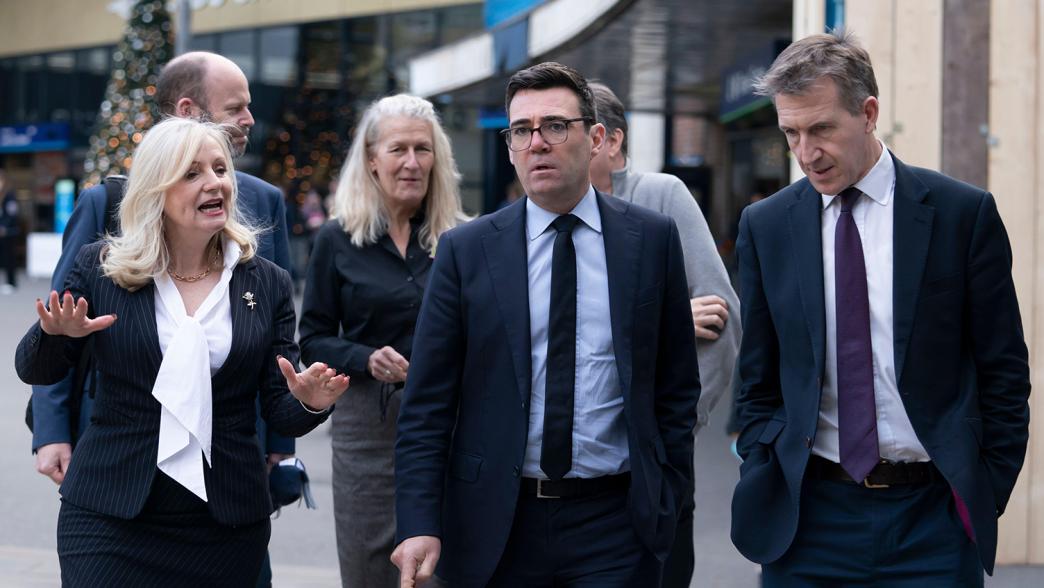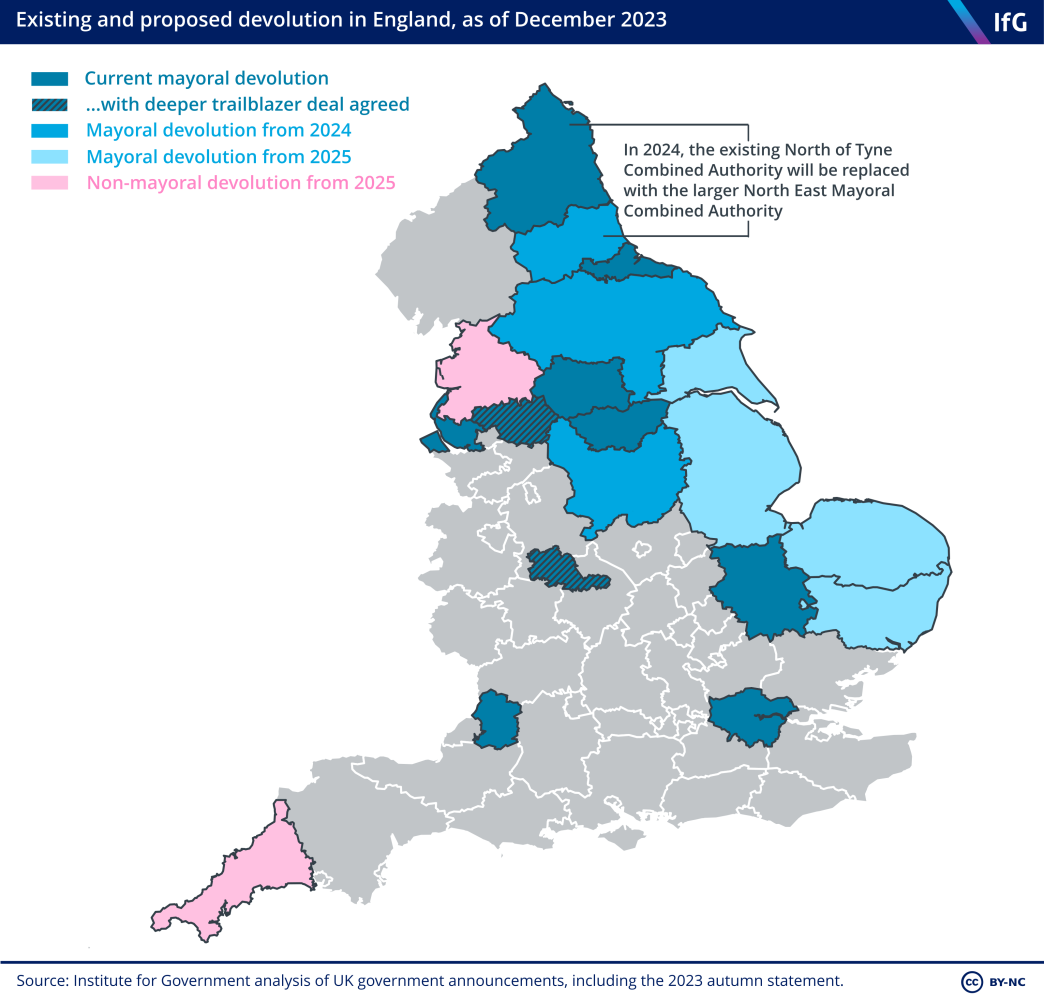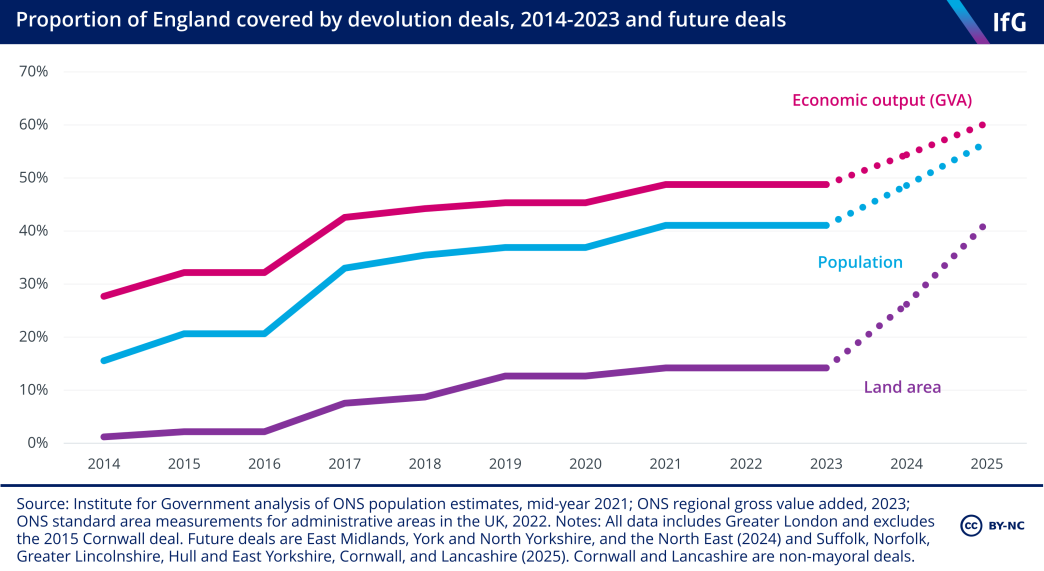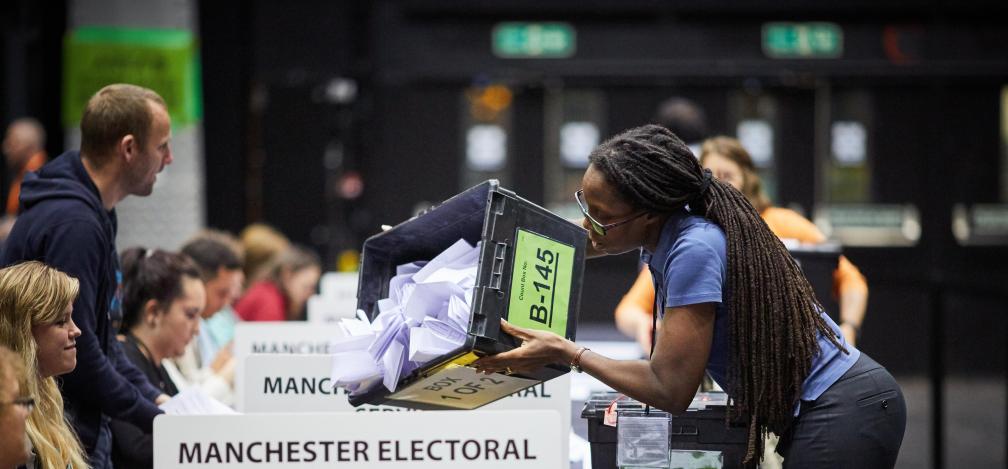English devolution
What is the history of English devolution? How much of England has devolution? Which powers are devolved?

As part of its Levelling Up strategy, published in early 2022, the government promised that by 2030 “every part of England that wants one” would have a devolution deal, backed by a simplified, long-term funding settlement. Since then a series of new devolution deals have been concluded.
The Labour Party has also promised that it will “complete the map” of English devolution if it takes power at the next general election.
What is the history of English devolution?
After 1997 Labour governments devolved powers to Scotland, Wales and Northern Ireland, but England was largely left out of this process. The exception was Greater London, where a mayor of London and London assembly were created in 2000.
Planned elected assemblies in other English regions were abandoned after a failed referendum in the North East in 2004. Instead, the English regions were granted a limited form of administrative decentralisation via ‘regional development agencies’ and ‘government offices for the regions’. However this regional tier was dismantled by the coalition government after 2010.
The government started a new process of English devolution in 2014, negotiating bespoke deals with groups of local authorities who formed new combined authorities chaired by metro mayors – a mayoral combined authority (MCA). Nine such deals were implemented between 2015 and 2019, mostly in city-regions. In addition, a more limited non-mayoral devolution deal was agreed in Cornwall in 2015.
The government is now devolving powers to other parts of England, including rural areas, and deepening the powers of some areas that already have devolution, starting with Greater Manchester and West Midlands.
To add to the complexity, the government has also legislated to create a new form of combined authority, a combined county authority (CCA), designed for areas with two tiers of local government. CCAs are formed by agreement between upper-tier councils only, unlike MCAs which must include district councils. Some devolution deals have also been agreed with individual county councils.
How much of England has devolution?
There are currently 10 areas with mayoral devolution in England: Greater London, West Midlands, Greater Manchester, Liverpool City Region, West Yorkshire, South Yorkshire, Cambridgeshire and Peterborough, Tees Valley, West of England, and North of Tyne.
Mayoral devolution is being extended to three new areas in 2024 – York and North Yorkshire, East Midlands, and more of the North East – and then to an additional four places in 2025: Suffolk, Norfolk, Greater Lincolnshire, and Hull and East Yorkshire.
In addition, new non-mayoral devolution deals will go live in 2025 in Lancashire and Cornwall.

Devolution currently covers 41% of England’s population, 49% of its economic output, and 14% of the land area. If the nine new deals are implemented as planned, this will increase to 57%, 60%, and 42% respectively, meaning the majority of England’s population will be covered by a devolution deal.

Which powers are devolved?
The powers devolved vary across the different devolution deals, with the most expansive powers on offer only to places that adopt mayoral leadership. Each devolution deal is negotiated separately between ministers and local leaders, but the government has published a four-level devolution framework with the different sets of powers on offer for each level. 7 Department for Levelling Up, Housing, and Communities. (2023). Technical paper on Level 4 devolution framework. www.gov.uk/government/publications/technical-paper-on-level-4-devolution-framework/technical-paper-on-level-4-devolution-framework#devolution-framewo…
Level 1 deals offer only a limited “strategic role in delivering services”. No level 1 deals have yet been concluded.
Level 2 deals can be concluded with county councils or combined authorities that are not led by a directly elected mayor. They offer control over the adult education budget, LEP functions, and the UK shared prosperity fund.
Level 3 deals offer more expansive powers and require the adoption of a mayor – either as directly-elected leader of a county council, or as chair of a combined authority. In addition to level 2 powers, they offer expanded powers over transport, local roads, urban regeneration and 30-year investment funds that combined authorities can allocate flexibly to support economic growth. Most of the existing MCAs hold the level 3 package of powers, as will the new mayoral deals going live in 2024 and 2025.
Metro mayors can also establish development corporations, with powers over planning and development, and can impose a precept on council tax to fund specific projects. In some cases, where boundaries align, metro mayors have also taken on the role of police and crime commissioner.
Level 4 deals will be on offer to existing level 3 institutions subject to their meeting capacity, governance and institutional culture criteria. They offer extra powers around skills, careers and transport functions as well as a role in local energy planning. They will also offer flexible ‘consolidated pot’ funding in two areas, local growth and place, and housing and regeneration. 8 Department for Levelling Up, Housing, and Communities. (2023). Technical paper on Level 4 devolution framework. www.gov.uk/government/publications/technical-paper-on-level-4-devolution-framework/technical-paper-on-level-4-devolution-framework#devolution-framewo…
Finally, two ‘trailblazer’ devolution deals, were agreed with Greater Manchester and the West Midlands in March 2023. These deals will devolve further powers over transport, skills, retrofitting, and housing. They also reform and simplify funding, consolidating multiple funding streams into more flexible ‘single settlements’.
Local and mayoral elections 2024
On Thursday 2 May, voters across England and Wales will head to the polls in a major set of mayoral and local elections. Keep up with our latest content, events and analysis on why these elections matter and the results when they come.
Find out more
What is the role of metro mayors?
The government intends for mayors to be “strong local leaders” that local residents can hold directly accountable.
Metro mayors are not powerful executive leaders in their own right. They can make progress with their plans only with the agreement of other local leaders.
The precise rules vary across the different combined authorities, and between different categories of decision. But some big decisions – such as the adoption of spatial plans for housing and infrastructure development – require unanimous agreement. Other mayoral levers can be exercised only with the support of specific local leaders. For instance, a mayoral development corporation (MDC) can be created only with the consent of the leader of the council where the MDC will operate.
Mayors can also influence policy outside of their formal responsibility by using the influence and authority that comes with their high profile and personal electoral mandate. This enables them to negotiate with central government and large businesses to bring investment to their regions. They can also convene coalitions of organisations to tackle complex problems such as rough sleeping, health inequalities or digital exclusion.
Directly elected council leaders – such as those proposed in Suffolk and Norfolk, as well as those that already exist in a handful of smaller local areas across England – are in a different position. Acting as executive mayors, they will exercise existing local government and newly devolved functions, subject to institutional checks such as the ability of councils to overturn the mayor’s budget with a two-thirds majority.
- Topic
- Devolution
- Keywords
- Local government Local elections
- United Kingdom
- England
- Position
- Metro mayor
- Publisher
- Institute for Government